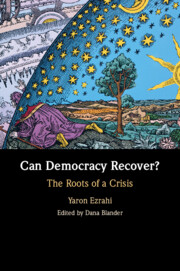Book contents
- Can Democracy Recover?
- Can Democracy Recover?
- Copyright page
- Dedication
- Contents
- Preface
- Words from the Author
- Introduction
- Part I The Rise of Western Politics following the Collapse of the Monistic Medieval Cosmology
- Part II The Emergence of the Epistemological Constitution of Modern Democracy
- Part III The Dialectics of Objectification
- Part IV The Erosion of the Epistemological Constitution of Modern Democracy
- 12 The Political Disempowerment of the Modern Democratic Citizen
- 13 The Elusiveness of Political Causality
- 14 The Loss of Self-Evident Public Facts and the Crisis of the Commonsense Conceptions of Reality
- 15 The Decay of the Epistemological Norm of Political Visibility
- 16 The Fall of Objectivity and Objectification
- Part V Democracy beyond Modernity
- Can Democracy Recover? Concluding Reflections
- Epilogue
- Index
12 - The Political Disempowerment of the Modern Democratic Citizen
from Part IV - The Erosion of the Epistemological Constitution of Modern Democracy
Published online by Cambridge University Press: 02 January 2025
- Can Democracy Recover?
- Can Democracy Recover?
- Copyright page
- Dedication
- Contents
- Preface
- Words from the Author
- Introduction
- Part I The Rise of Western Politics following the Collapse of the Monistic Medieval Cosmology
- Part II The Emergence of the Epistemological Constitution of Modern Democracy
- Part III The Dialectics of Objectification
- Part IV The Erosion of the Epistemological Constitution of Modern Democracy
- 12 The Political Disempowerment of the Modern Democratic Citizen
- 13 The Elusiveness of Political Causality
- 14 The Loss of Self-Evident Public Facts and the Crisis of the Commonsense Conceptions of Reality
- 15 The Decay of the Epistemological Norm of Political Visibility
- 16 The Fall of Objectivity and Objectification
- Part V Democracy beyond Modernity
- Can Democracy Recover? Concluding Reflections
- Epilogue
- Index
Summary
The chapter examines the impact of human imprinting on Nature, blurring the boundaries between humans and Nature and diminishing human freedom. Enlightenment ideals granted individuals rationality, emphasizing their will in the realms of science and politics, enabling them to differentiate absolute truth from human-dependent matters. The blurred boundaries challenge rationality as a measure of norms and erode commonsense – the shared understanding of how the political system operates and the comprehension of causality. These developments lead to the “loss of the subject” and threaten the perception of the individual as an autonomous political agent. The erosion of the dualistic cosmology is also due to feminist theories arguing that women were wrongly placed within the realm of Nature rather than Culture. Similarly, postcolonial perspectives contend that Indigenous peoples were dehumanized and considered part of Nature under the dichotomous cosmology. In the postmodern era, there is a tendency towards hybridization and interactive dynamics. Ezrahi asserts that democracies in a hybrid world require “human-like” judgments from machines and algorithms, necessitating an examination of the intentions and interests of their designers. The question that needs to be asked is whether “humanized machines” serve the interests of a politics of freedom.
- Type
- Chapter
- Information
- Can Democracy Recover?The Roots of a Crisis, pp. 129 - 133Publisher: Cambridge University PressPrint publication year: 2025

